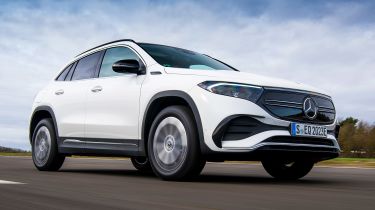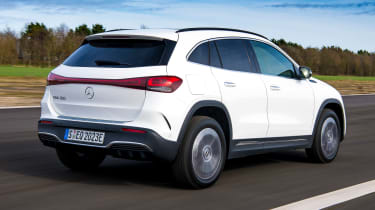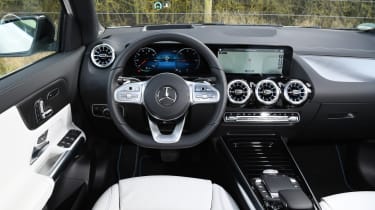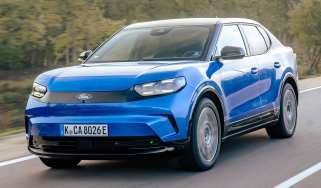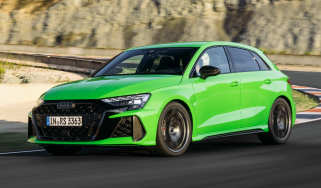New Mercedes EQA 2021 review
The new all-electric Mercedes EQA SUV takes on the Volkswagen ID.4 and Volvo XC40 P8 with up to 263 miles of range

Verdict
Compared with Merc’s first EQ-specific model, the smaller EQA represents quite compelling value for money. It’s an impressive package, in fact, with loads of kit, sensible and safe driving dynamics and a decent real-world range. Charging speeds are competitive if not quite class-leading, and it’s certainly not lacking the usual Mercedes sparkle inside the cabin. It doesn’t afford the same kind of space advantages that bespoke EV rivals like the Volkswagen ID.4 offer, however, so be sure this EQA will function as required before signing on the dotted line.
As a carmaker, you have two choices when it comes to engineering your new EV. You can either design a bespoke electric platform from the ground up, or adapt an existing petrol or diesel model to make the battery, motor and associated hardware fit.
Mercedes chose to do the latter when launching its first electric car, the EQC, and is repeating the recipe with its new EQA. Based on the petrol, diesel and plug-in hybrid-powered GLA, it’s a zero-emissions SUV designed to take on cars like the Volkswagen ID.4 and Volvo XC40 P8.
Styling-wise, the EQA’s ties to the GLA are clear. Proportionally very similar, Mercedes has tweaked it just so, with a blanked-off grille and a full-width front light bar – just like the one you’ll find on the EQC. From the side (and indeed, the driver’s seat) you’d be hard pressed to tell the EQA and GLA apart; another full-width light bar and repositioned number plate complete the changes at the rear.
More reviews
Prices for the EQA start from just £40,495 after the government’s £3k plug-in car grant (PiCG) has been taken into account. That’s significantly less than the only slightly more spacious EQC (from £65,720) and on par with some of the flashier GLA variants – representing what is quite a significant breakthrough when it comes to electric and petrol car price parity.
In line with the rest of the Mercedes range, buyers can step up from Sport to AMG Line trim, as well as add Premium and Premium Plus packs for added kit and greater luxury.
Basic models come well equipped, with 18-inch wheels, LED lights front and rear, plus sat-nav and smartphone integration with Apple CarPlay and Android Auto. Every version also gets heated Artico man-made leather throughout. Step up to AMG Line and you’ll add sportier styling, different wheels and illuminated door sills. Inside there’s a set of sports seats and some brushed aluminium trim. The Premium pack (£3,000) brings 19-inch wheels, while also adding a sliding panoramic roof and keyless go. Inside you get the augmented-reality nav system from the A-Class, as well as wireless phone charging and an upgraded sound system.
The Premium Plus pack is another £6,000, but this adds 20-inch multi-spoke alloy wheels, an adaptive damper and a 360-degree parking camera, plus a Burmester stereo and a head-up display.
Quality, on the whole, is very good. Most of the areas you interact with on a regular basis are covered in soft-touch materials, and only lower-down on the dash will you find cheaper plastics. Those coming from larger, more expensive Mercedes models may notice some of the usual gloss black buttons have been replaced by harder-wearing satin trim, but you get the same trackpad and widescreen infotainment, giving an interior ambience befitting of the EQA’s price tag.
Of course, the EQA will not only appeal to private buyers looking to lessen their impact on the environment, the rock-bottom CO2 emissions and decent 249-263-mile (depending on spec and wheel choice) range is sure to make it a company car favourite. From April, business users running an EQA – or any EV for that matter – will pay Benefit in Kind tax of just one per cent; a GLA 250 e PHEV falls into the 11 per cent bracket, while the diesel GLA 220 d commands a 32 per cent rating.
That aforementioned range is competitive in this area of the market; on par with the Volvo, if slightly behind the forthcoming ID.4. On a bright but cool winter’s day we saw more than 200 miles on a full charge, and even after a full morning of unsympathetic testing, the EQA’s trip figure refused to drop significantly out of kilter with actual miles driven.
Charging is another area where the EQA is competitive, if not class-leading. The smallest Mercedes EV will accept a public rapid charge of up to 100kW (the Volvo will charge at up to 150kW; the VW tops out at 125kW), allowing for a 10-80% charge in 30 minutes. It can also handle 11kW three-phase charging from empty to full in 7h 15mins, though the more common 7kW home wallbox will perform the same task in around 11 hours.
Our first test of a production-ready EQA comes courtesy of a left-hand-drive German-spec Edition model, which – 18-inch wheels and winter tyres withstanding – is closely comparable with the UK market AMG Line Premium Plus.
And despite being over 200bhp down on the XC40, the EQA is no slouch. That familiar hit of instant electric torque is present and correct, but away from full-bore standing starts, the Mercedes offers a softer and more progressive power delivery. Being front-wheel drive (rather than 4MATIC) makes it feel lighter on its feet than the much heavier EQC, too.
It’s hard to get a true feel for the EQA’s handling given the fact our car was on the smallest wheels shod in winter rubber, but however it was driven the electric SUV displayed a predictable and safe manner. The light steering and its tendency to roll through the bends more than, say, a Polestar 2, don’t make this a car you’ll relish throwing down your favourite back road.
But don’t let that detract from what an accomplished all-rounder the EQA is. You don’t get the double-glazed acoustic glass found on some more expensive Mercedes models, and yet it remains a refined and quiet place to spend time. You’ll hear very little around town, in fact, with only a degree of muted wind whistle and tyre noise on the motorway. Strong regenerative braking makes this a car you can drive largely on one pedal, too.
The adaptive dampers on our test car had very little effect on the way the EQA drove – either at a cruise or when cornering. Even driving the same stretch of road back-to-back proved the difference between Sport and Comfort was negligible; again making one question the worth of the top-end Premium Plus spec.
Perhaps the only remaining area of consideration is practicality, and this is possibly the EQA’s Achilles heel. Its boot is significantly smaller than the equivalent GLA, and down on the pure-electric Volvo XC40’s, too. In fact, at 340 litres the Merc’s load bay is more compact even than the boot you’ll find in a Renault Clio supermini.
Still, what you lose in boot space you gain in cabin volume. There’s enough space in the back for six-foot adults to sit behind similarly-sized front passengers – even with our car’s panoramic roof. Both head and leg room are generous, and while the floor isn’t completely flat, there’s only a small transmission hump for middle-seat occupants to contend with.
| Model: | Mercedes EQA 250 AMG Line |
| Price: | £41,995 |
| Engine: | 80kWh battery (66.5kWh usable), single electric motor |
| Power/torque: | 187bhp/375Nm |
| Transmission: | Single-speed auto, front-wheel drive |
| 0-62mph: | 8.9 seconds |
| Top speed: | 99mph |
| Range: | 249-263 miles |
| CO2: | 0g/km |
| On sale: | Now |

